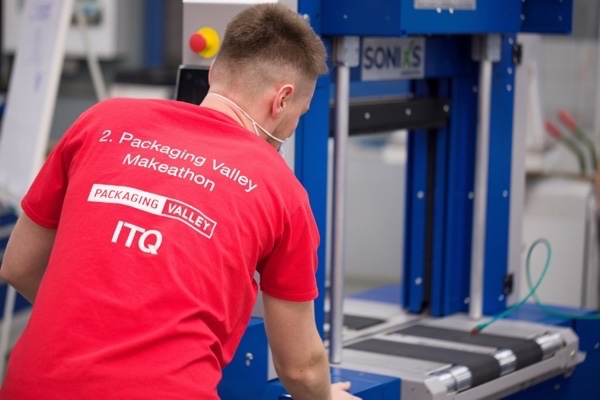Finishing & Screen Printing
Packaging Valley Makeathon 2021: Working together for a smaller carbon footprint

Friday 03. December 2021 - At the company MOSCA in Waldbrunn, which was a co-organiser for the first time this year, the topic was Green Digital Twin. The question was how to obtain reliable data on the emissions and costs caused during production.
At the second Packaging Valley Makeathon, twelve participants from different professional fields met at MOSCA to work together for two days on solutions for more sustainability in end-of-line processes. Following the example of the “Green Digital Twin”, they developed ideas on how to make the carbon footprint visible and minimise it. The projects are now to be further developed.
When it comes to efficient and environmentally friendly production, companies are called upon to conserve resources and reduce CO2 emissions. But the tasks are complex and the knowledge very fragmented, which does not make it easy to find solutions alone and “on the side” in everyday life. The Packaging Valley Makeathon, which took place for the second time this year, creates a space for developing new ideas together. At seven locations, it offered young people in the industry in particular the chance to tackle the complex challenges of sustainability in the packaging process.
At the company MOSCA in Waldbrunn, which was a co-organiser for the first time this year, the topic was “Green Digital Twin”. The question was how to obtain reliable data on the emissions and costs caused during production. Because without knowing the actual state, it is difficult to improve the future. This is where a “Green Digital Twin” comes in handy, i.e. an exact virtual copy of a machine, a process or entire production facilities that collects all relevant data in real time and makes it visible via dashboards. The task of the participants was to use the idea of a Green Digital Twin to visualise and then reduce the CO2 footprint of packaging processes. “Showing in the first place how resource-efficient and low-emission packaging processes are is an important step in plant planning and optimisation,” explains Christoph Leppla, Head of Research and Development at MOSCA.
Groups develop implementable solutions
Composed of trainees, students and engineers, the teams developed two approaches to solutions and learned not only with each other, but above all from each other based on the concrete problem. In two groups, they devoted themselves to different approaches: During the two days, one group developed an intuitive software that not only displays the performance of the EVOLUTION SoniXs TR-6 machine, but also makes the savings of a more energy-efficient mode visible. A second group programmed a calculator during the Makeathon that enables a comparison of the CO2 consumption of different consumables: Via a dashboard, the material used and the number of strappings on a product can be specified, the programme then calculates the respective CO2 costs.
Cooperation wins
“Both groups were incredibly committed. They worked until late in the evening – and were right back here on the mat the next morning,” says Leppla. Together with his colleagues, he provided advice and support to the participants. “The fact that the participants came from different professional groups and educational levels was an enormous benefit for us and the groups themselves. Many of the younger participants learned how learning and working in such diverse groups works,” Leppla continues. It was particularly helpful that both groups were able to work on real machines and thus make their progress directly visible. For this purpose, the company WAGO provided measuring technology especially for the Makeathon, which directly displays the energy consumption of the machine.
After the final presentation, the participants at MOSCA were satisfied and Leppla was also pleased with the result: “The ideas that emerged have shown where there is still potential for optimisation in our system and are thus a good starting point for more sustainability.” MOSCA now wants to pursue the projects further: They provide precisely the data needed to further develop the machines towards lower emissions and higher efficiency. So the Makeathon participants’ joint puzzling and learning is paying off and is gradually reducing the carbon footprint of the machines and consumables – and thus bringing more sustainability to the packaging processes.
Translated with www.DeepL.com/Translator (free version)
